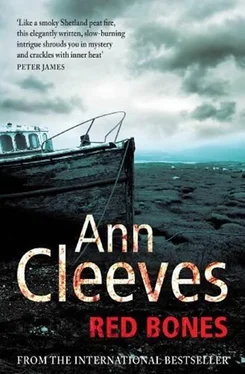Sandy couldn’t tell whether Evelyn was more irritated by him or by her daughter-in-law.
‘Well, I’m here now.’
Michael turned round. He took Sandy in his arms, gave him a great bear-hug. ‘Now you’re the great traveller and you can find your way to London on your own, there’s no excuse for not visiting.’
‘I will,’ Sandy said.
Amelia was already in the passenger seat. As the cars drove off she waved to Sandy. A little flutter of the hand, as if she were a film star, or the Queen. Sandy waited until both cars were well on their way to Symbister before he went into the house.
Inside there were signs of the hurry there’d been in getting Michael’s family ready to leave. The washing-up had been done, of course – Evelyn would never leave the house with dirty pans in the sink, but they were still piled on the draining board and not dried. There were crumbs on the floor and the waste bin was full.
Now he was here, Sandy wasn’t sure what he was looking for. He sat down at the table and forced himself to think clearly. He needed reassurance, that was all. He couldn’t understand how his parents had managed to renovate the house on their limited income. He wanted to check that they weren’t in debt. That had been his nightmare: that they’d borrowed foolishly to allow his mother to compete with the pelagic fishing families. He knew the stress that came from owing money. He was crap about finance and in the end he’d cut up his credit card because he couldn’t face the monthly bills; he still remembered the tightness in the pit of his stomach when he’d realized how much he owed.
The tension between his parents could be caused by anxieties about money. He preferred to think it was about that. Any other cause – sex: that one of them had fallen for someone else – was simply horrible. They were old and they were his parents; he couldn’t contemplate it. He wondered if he was overreacting. Perhaps the two deaths so close to home had made him jittery and caused him to blow trivial arguments out of proportion. Then he remembered his father yelling at his mother after Mima’s funeral. Joseph had never raised his voice to Evelyn throughout their marriage, even when he was exhausted after working all day for Duncan Hunter. Sandy wasn’t overreacting. Something was wrong between them.
Then came the difficult part. He forced himself to order his ideas and take the next logical step. If his parents had problems with money, was it possible that one of them had shot Mima for her house and her land? Not Joseph. He could tell how upset his father was. Besides, he’d been made a good offer for the house already and he’d turned it down. Evelyn then? Sandy had known all along that this was where the thinking would end up. Evelyn had never particularly got on with Mima. She could shoot well enough and there was a shotgun in Utra. But if the couple had no money problems, then there would be no real motive. That was why Sandy was lurking in Utra like a thief or a spy.
He knew where his mother kept the bank statements: in the drawer in the sideboard in the living room, where the lasses had put the silver coins before the man from the university had taken them away. It was locked, but the spare key was hanging from a hook in the larder along with all the others. Evelyn had always been the one to look after the family finances. Even when his father had worked for Hunter she’d sorted out the bills and the invoices and filled in Joseph’s tax returns. Sandy could remember her sitting at the table every month, going through the bank statements, frowning when she saw how little they had to live on until the next paycheque.
He found the key and unlocked the drawer. The statements were neatly clipped together in the blue file he remembered. He looked immediately at the balance and felt a wild relief when he saw it was in credit. He scanned back over the past twelve months. No problems. Little excess in the pot, but no debt. He wondered if Evelyn could have taken out a loan, but there was no sign of that and the paperwork would be in the drawer too. How could I have doubted her? he thought. How could I have even considered for a minute that she would be capable of murder?
He looked at his watch. It was almost six o’clock and he felt suddenly ravenous. He hadn’t had any lunch. He felt like celebrating. He thought he’d go down to the Pier House for his supper, maybe have a couple of pints. Some of the boys might be in and they could play cards, talk about the old times. Davy Henderson should be around. Maybe Anna had relented and let Ronald out for the evening. Then he remembered that Perez had asked him to talk to Sophie. He locked the drawer and hung up the key again, making sure everything was as it had been before. He hated the idea that his parents might know he’d been snooping.
On the way to Symbister he stopped by the Bod. The Pier House would be quiet this early and they’d have the chance to talk. It wasn’t such a chore; Sophie was good company. She had a knack of making every man she was with feel special, attractive. He wondered whether he could persuade her to open up. If he’d made more effort to get to know Hattie, perhaps she’d have felt able to confide in him too. But when he knocked on the door there was no answer. He looked inside. All the archaeological equipment was still there in a heap at one end of the living room, but Sophie’s personal belongings seemed to have gone.
In the Pier House, Cedric was behind the bar, staring into space. He’d looked the same age since Sandy had been a boy, but recently he seemed to have got older. His responses were slower.
‘Have you seen the lassie from the Bod?’
Cedric turned his head to look at Sandy.
‘Aye she was in earlier. She took the ferry out. I was down at the pier to meet Jean. Sophie was all loaded up like a packhorse with that huge rucksack. She seemed pleased to be away.’
Sandy phoned Perez and told him what had happened. Perez went very quiet, but he didn’t seem to think Sandy was to blame for allowing the girl to leave. It occurred to Sandy that Hattie might be travelling to Aberdeen on the same ferry as Sophie, but she’d be in the anonymous Transit van that the undertaker used to carry bodies for post-mortem, and Sophie would be in the bar.
When Perez arrived back in Lerwick, he called in to his office. It had a sleepy feel: most of his team were taking Easter leave. He phoned the Fiscal’s secretary and learned she’d be in a meeting for most of the afternoon. He made an appointment to see her first thing the following morning. He was looking forward to getting home early, sticking some clothes in the washing machine, cooking a meal for himself. In the meantime he began to wonder about the best way to track down the nationality of Berglund’s family.
Although he’d planned a quiet evening at home, when he got there he couldn’t relax. He found it impossible to stop thinking about Sophie, rerunning in his head the conversation on the cliff by the golf course. She was right about the note. Of course not all suicides left notes, but Hattie was a writer. If she were planning to kill herself she’d have written a considered letter to Gwen James explaining what she was doing. There wouldn’t have been a panicky phone call. Suddenly he wanted this over. Soon Fran would be home. He didn’t want her to arrive back in the middle of an investigation, to find him distracted and exhausted.
In the end he ran himself a bath. His bathroom was thin and narrow, the bath old and deep with scarred enamel. The room filled with steam and condensation ran down the window. It didn’t matter. The house was damp anyway, what difference would it make? He lay back, trying to let go of the case, but the possible scenarios, the shifting relationships, swirled into his head and out again. He was half asleep. A Dance to the Music of Time. Who had written that? He saw the Whalsay folk past and present waltzing in and out of his consciousness. A Norwegian sailor and a screwed-up young archaeologist, an ambitious businesswoman and an old man disabled by a stroke. How did they all fit together? He shut his eyes and felt he was floating towards a solution.
Читать дальше












